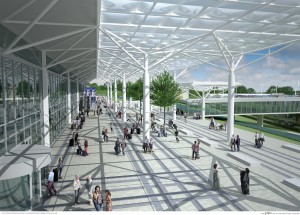Bristol Airport has said it will create more than 1,000 jobs over the next decade as part of its further development to enable it to handle 12m passengers a year.
The scheme, which has just been submitted to North Somerset Council planners, would also generate an additional £1.4bn for the regional economy by the mid-2020s. 
The planning application is the latest stepping stone in the airport’s long-term plan of being capable of handling up to 20m passengers a year by the mid-2040s.
Annual passenger traffic through the airport is on target to hit a record 8.5m this year with further growth to 9m in 2019. Under its current planning permission, the terminal is limited to 10m passengers a year – a figure it is likely to hit in the early 2020s.
While the airport has grown rapidly over recent years – it is the fifth busiest in the UK outside London and is low-cost carrier easyJet’s largest regional hub – a lack of capacity in the near-to-mid-term could result in airlines restricting future investment in new routes.
The airport, which currently employs around 4,000 on its 196-hectare site, estimates it also supports just under 24,000 jobs in the wider economy of the South West and South Wales.
More than £160m has been invested by the airport’s Canadian owners Ontario Teachers’ Pension Plan since 2010 in new facilities and infrastructure to keep pace with growth in passenger numbers.
Under the new plans the terminal will be further enlarged, with more space for passenger and baggage facilities and the canopy at the front of the building will be extended over a pedestrianised forecourt, pictured above in a CGI.
There will also be more parking spaces, with the number of on-site multi-storey car parks increased to three and the popular Silver Zone extended to help prevent overspill into local villages.
A new loop road layout will improve traffic flow on the airport site while improvements at the West Lane and Downside Road junctions on the A38 are also included in the plans to cope with the increased traffic.
Improvements are also planned to the airside infrastructure, including a new taxiway link to allow better access to the runway for aircraft.
The cap on night flights at the airport, which limits them between 11:30pm and 6am to a total of 4,000 a year, will not be increased – although the airport is seeking to remove seasonal restrictions which stipulate how this quota is distributed between summer and winter.
Bristol Airport chief executive officer Dave Lees said: “Following consultation with the local community, airline customers, passengers and other stakeholders, these plans set out sustainable development to meet demand for air travel to and from the South West and South Wales over the next decade. They will help deliver more routes, destinations and jobs.
“These plans are a practical step to ensuring we continue to connect our region to the world, providing a gateway for business, investment and tourists. At the same time, we have sought to minimise and mitigate any impacts on the local community and environment, building on our track record of investment in surface access improvements.”
The airport’s plans were welcomed by business leaders. CBI South West director Deborah Fraser said: “Now, more than ever, unlocking new aviation capacity to deliver global trade links is critical for a strong UK economy.
“Extra capacity will drive trade and investment, create new jobs and help British businesses thrive at home and abroad. Bristol Airport’s aim to boost capacity to 12m passengers a year is a vital part of this strategy, and will complement expansion schemes at other airports.”
James Durie, chief executive of Bristol Chamber of Commerce & Initiative at Business West said the business community across the region strongly supported the growth of the airport.
“As a key global gateway for the region, its offer already supports those trading in overseas markets but also making Bristol and the South West a place of choice for people to visit, live, learn and invest.
“We want and need to see its growth and development supported by the necessary surface and other infrastructure, but also the economic benefits from it felt particularly by those most in need in the region.”
“Extra capacity will drive trade and investment, create new jobs and help British businesses thrive at home and abroad. Bristol Airport’s aim to boost capacity to 12m passengers a year is a vital part of this strategy, and will complement expansion schemes at other airports.”
EasyJet flies to 67 destinations from Bristol using the 15 aircraft permanently based at the airport. In total the airport operates 126 direct flights.
In June Bristol was named ‘Best Airport in Europe’ in the 5-10m passenger category at the annual awards dinner held by European airports association, ACI Europe. It was also recently voted the UK’s best airport by the travel trade in the annual TTG Awards.














